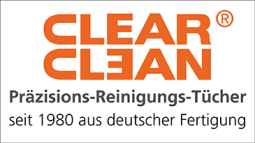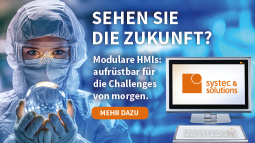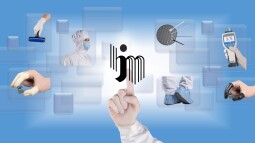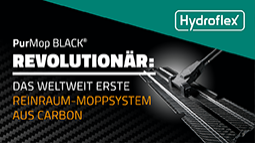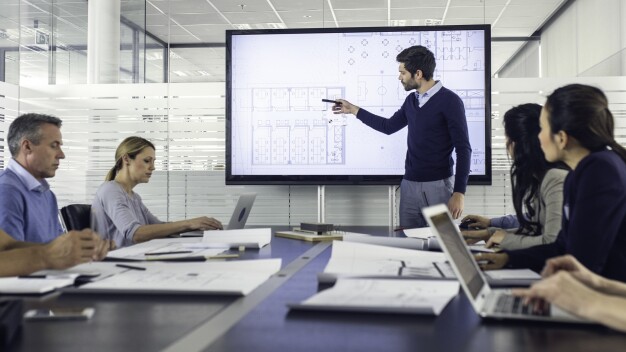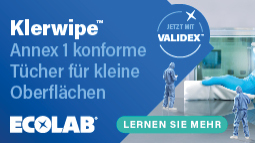- Trade fair
A new approach to cleanroom project work: qualification and teamwork - Cleanzone is the place to start
The shortage of skilled personnel is a hot topic today. In some ways, the situation in the cleanroom sector appears to differ, with areas of activity that are less rigidly defined like “fitter” or “laboratory technician”. Yet people with the right attitude, a strong desire for knowledge and an ability to learn have huge opportunities for professional development. On 25 and 26 September 2024, Cleanzone in Frankfurt am Main will bring the right people together for a lively exchange.
They really do exist: targeted education programmes for cleanroom technology. Students interested in entering this field can acquire skills in key application areas from the Hermann-Rietschel-Institut at the Technical University of Berlin. Here they will be learning about a range of topics, including aerosol physics, cleanroom filters, measurement equipment/technology and sampling in cleanrooms, airflow concepts, pressure control, control and regulation technology, construction and operation, cleaning, human resources, clothing and – yes, even comfort in cleanrooms, as well as standards, cleanroom classification and energy efficiency. 40 percent of the course is devoted to technical expertise, 30 percent to methodological expertise, 20 percent to systems expertise, and 10 percent to social skills. As can be seen, interdisciplinary thinking is a major part of this approach.
Much the same applies to the Environmental Campus Birkenfeld at Trier University of Applied Sciences, where the focus is on the field of “Cleanroom Technology in Pharmaceutical Manufacturing (M. Eng.)” A great deal of weight is given to good manufacturing practice (GMP), for example GMP-compliant ventilation and air conditioning technology and satisfying special requirements for process, regulation and control engineering and technology. First and foremost, however, “interdisciplinary project work” is always part of the programme.
For interested individuals who have completed a technical training and have at least two years of experience in technical plant engineering, a certificate course to become a “Cleanroom technology project manager” offered by the IHK Academy Munich may be just what they are looking for. Created in collaboration with the German Cleanroom Institute (DRRI), this six-day course teaches the fundamentals of cleanroom technology, including interdisciplinary technologies, strategies for facility construction (particularly regarding their energy efficiency), and broad-based technical and theoretical knowledge. Cleanroom technology also plays a significant role in the bachelor’s degree programme at Albstadt-Sigmaringen University. Pharmaceutical technology is explored in greater depth, with a particular focus on sterile engineering. Cleanroom technology is also an important part of the “Facility and Process Design” master’s degree programme, particularly in the “Factory planning” module.
Real world experiences have made it clear just how complex cleanroom technology really is. That is why courses of study, training and professional development programmes all require a fundamental understanding of the complexity of the tasks involved in cleanroom technology, as well as of possible solutions.
In cleanroom projects, the individual disciplines don’t work separately. Instead, the emphasis is on the production environment and on a high degree of cooperation. It goes without saying that microelectronics, pharmaceuticals, medical technology, food, research laboratories, and the production of glass, film and components all place very different demands on cleanroom technology. With bread, for example, the key is to prevent the formation of mould, while particulate contamination at the micrometre scale plays no role whatsoever – for microelectronics the situation is exactly the opposite.
Examples from actual practice in a wide range of fields
Josef Ortner, founder of Ortner Reinraumtechnik GmbH in Villach, recommends new forms of project work that make it possible to satisfy precise requirements. He offers examples from his partnership with companies in the microelectronics sector in southern Austria. As part of an integrated project management approach, they got together to ask themselves what the future of cleanroom technology might be over the next ten years in the sector. Their answer: a high degree of automation and factories without people. It was with this in mind that, as part of a small pilot project, the existing infrastructure for semiconductor production was improved and an air purifying system was integrated into the overall system – but this was done by means of a new type of collaboration ...
The principle behind integrated project management (IPA) is that every company involved in the project should share their calculations, so that everyone can work together to decisively improve the quality of existing production. The general contractor supplies everything that is required (e.g. coating materials), while the gas, heating, water and electrical technicians – as well as other trades – work together as effectively as possible on the installation. Anyone looking to find out more about integrated project management will have their chance to do just that at Cleanzone: on 25 September 2024 at 10:40 a.m., Friedrich Seeger-von Klitzing (Yukon Projects GmbH) will be giving a presentation entitled “Integrated project management – how to make your cleanroom project a success”.
In another example, Josef Ortner worked for a specialist in the field of water dispensers and beverage machines. However, instead of simply winning a contract and then going it alone, his philosophy is: “I will sign any contract as long as we are subsequently able to work on the project together.” So he got the University of Graz – among others on board.
Even though this involved an unusual learning process for the technicians and engineers working on the project, as a result of this collaboration they were able to develop a new device. And with this, they were able to solve the problems that they had been having with microbial contamination.
To make this form of project work a success, the participating partners require mutual trust (“The other partners really do want to work together fairly”); openness (“What are the things that I am really good at, and where do I need to rely on the expertise of others?”); an assumption of responsibility by each individual party (“For areas in which I am particularly strong, I am also willing to lead the way and take responsibility); and good leadership.
The person or party with overall responsibility for the project must ask themselves: How can we achieve the level of purity and sterility required by the product – and do so where it is required – and how can I get all of the employees to be interested in what they are doing, to continue learning, and to think outside of the box?
With technology and project work continuing to develop and evolve, lifelong learning is a fundamental requirement for success in the field of cleanroom technology in particular.
For example, at the Cleanroom Future Training Centre in Frankfurt am Main – the “City of Cleanzone” – it is possible to complete a certificate course for cleanroom managers. The content is communicated using a specially developed concept known as “hands-on instruction in cleanroom technology”.
Other educational content developed especially for cleanrooms includes the “Mixed Reality (MR) Cleaning” system created by viality AG (Dortmund) in cooperation with myCleanroom.de (Heidelberg). Their concept draws on the benefits offered by virtual and enhanced reality. VR glasses make specific areas visible to cleaning staff by overlaying them in a coloured hologram. With this visualisation, the MR system raises awareness of the infection risks found in these areas. Cleaning staff can therefore immediately recognise critical areas – creating the optimum conditions for correct and effective cleaning. The system can also be used outside of training in daily operations. More information on the use of VR to optimise your product and cleanroom production will also be provided by Ed Butler (Business Development Sanner GmbH) in his presentation at Cleanzone on 25 September 2024 at 3:00 p.m.
Cross-functional Building Information Management (BIM) concept
In addition to individual examples from actual practice, there are also cross-functional concepts, one of which is BIM (Building Information Management). This encompasses a great deal, including a virtual round table for architects, engineers, laboratory planners and cleanroom specialists, airflow simulations, and a framework from the Association of German Engineers (VDI) for implementation in actual practice (VDI 2552). When used properly, this makes it possible to avoid duplicate work and eliminates many sources of error (such as the conflict between the central input for ultra-pure water and an extinguishing water line).
New forms of project work and cross-functional concepts like BIM have something in common: both require a bit more manual and mental input at the beginning, and perhaps even higher investment in the project, but promise an even greater payout at the end. This can include problem-free completion of the project and financial savings in operation, because even some of the more demanding details have been considered and optimised right from the start (such as the configuration of an airlock system, performance data for ventilation systems in cleanrooms, the materials utilised, even maintenance and hygiene plans). Most importantly, however, the quality of products is improved.
What this means for people in cleanroom technology
It is clear that many aspects of cleanroom technology are complex. However, according to Josef Ortner: “I have always found this to be a fascinating field. The tasks we are confronted with are amazingly diverse. And, perhaps most importantly, everything needs to be considered very carefully, because sometimes it really is a matter of life and death, like in pharmaceutical production.”
An excellent opportunity for experts to consider their own opportunities in the field of cleanroom technology and for companies to meet numerous good potential employees will be provided by the Cleanzone trade fair on 25 and 26 September 2024 in Frankfurt am Main.
![]()
Cleanzone
Messe Frankfurt Exhibition GmbH
Ludwig-Erhard-Anlage 1
60327 Frankfurt am Main
Germany
Phone: +49 69 75756290
Fax: +49 69 757596290
email: anja.diete@messefrankfurt.com
Internet: https://cleanzone.messefrankfurt.com
